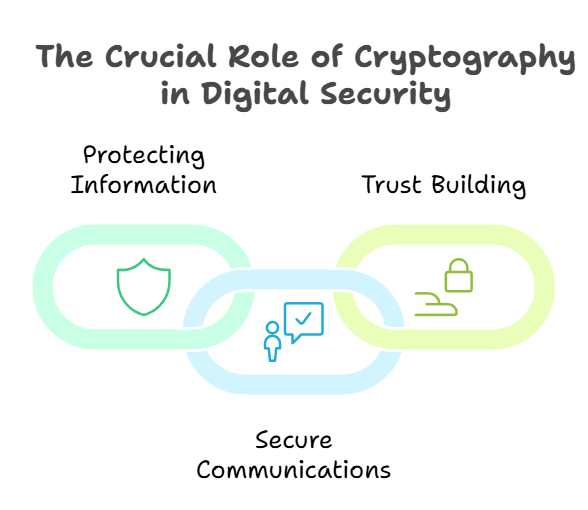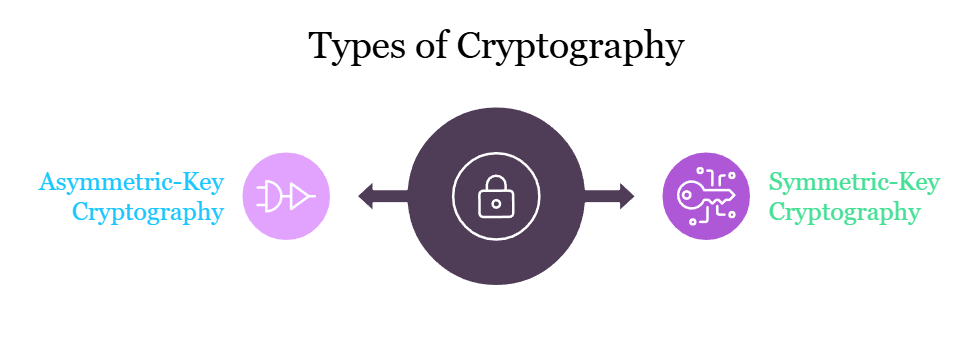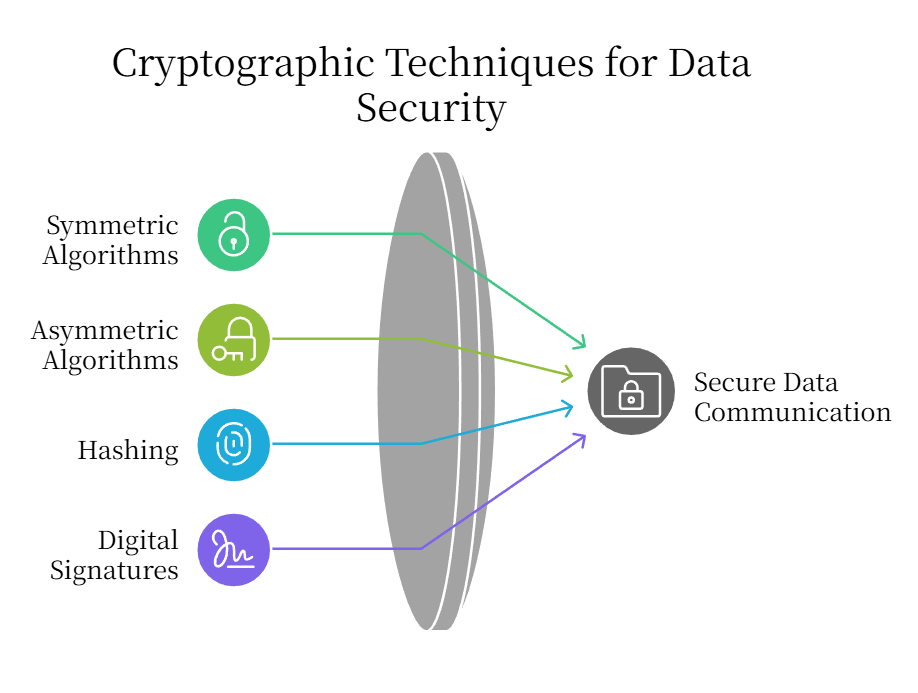What is Cryptography? Definition, Importance, Types 2025

What is Cryptography? Definition, Importance, Types
Ever wonder how our digital world keeps our sensitive information safe? It’s all thanks to cryptography. This field is key to keeping data secure. It ensures that ensures that our digital messages are private, whole, and real.
Key Takeaways
- Cryptography is the practice of securing information and communications through the use of codes and ciphers.
- It plays a vital role in safeguarding sensitive data, enabling secure communication, and protecting against cyber threats.
- Cryptography involves the transformation of data into a form that appears random and meaningless to unauthorized parties.
- There are two main types of cryptography: symmetric-key cryptography and asymmetric-key cryptography.
- Cryptographic techniques are widely used in various applications, including online banking, e-commerce, secure messaging, and blockchain technology.
Introduction to Cryptography
In today’s digital world, keeping data safe is key. Cryptography, the science of protecting data, ensures that our personal, financial, and business information stays private. It transforms data into a secret code only the right people can read.

This process uses ciphers and algorithms for encryption and decryption. It helps keep online chats, mobile messages, and even blockchain info safe.
Cryptography’s Role in Data Security
With more need for safe chats and more cyber threats, cryptography has grown. Now, we use things like symmetric-key and asymmetric-key cryptography to keep data safe. These methods are vital for protecting our digital info from hackers.
They help keep our data private and make sure our online talks are secure.
Learn more: Different Types of Cyber Security
Evolution of Cryptography Over Time
Cryptography has existed since ancient times. Over the years, it has changed a lot, from simple codes to today’s complex public key cryptography. Now, we have algorithms like AES, RSA, and Blockchain that improve data security.
These have helped create strong ways to send secure messages and keep data safe for many uses.
As tech gets better, cryptography remains a top way to keep data safe. It continues to find new ways to protect our information in a world that’s becoming more connected every day.

What is Cryptography?
Cryptography is the art and science of keeping information safe. It changes readable data into a secret code using special algorithms and keys. The main goals are to keep data secret, make sure it’s not changed, and prove it’s real. It also helps stop hackers from getting into systems.
What is cryptography? Simply put, it’s about keeping information secret so that only those who are allowed can read it. Cryptography uses encryption, hashing, and digital signatures to keep digital information safe.
Cryptography meaning is about keeping digital info safe from hackers. It’s key for protecting sensitive data and keeping online chats and info secure. It helps fight off cyber threats.
Cryptographic services are used everywhere, like in banks and online shops. They keep data safe from being stolen or changed, which is important to prevent cyber attacks like listening in or pretending to be someone else.
What do you mean by cryptography? It’s the tech that keeps online info safe. It lets people and groups keep their data and messages private from others.
Importance of Cryptography
Cryptography is key to keeping sensitive information safe and making online conversations secure. It keeps data safe from those who shouldn’t see it, which is crucial for keeping personal, financial, and business information safe.

It’s vital for safe online deals, keeping messages private, and making sure digital data is true.
Protecting Sensitive Information
Today, keeping data safe is more important than ever. Tools like cryptographic hashing and public-key cryptography are key. They protect personal information, financial details, and secret ideas.
Enabling Secure Communications
Cryptography is the heart of secure chats. It makes sure messages are private and true. Authentication protocols and cryptographic applications help prove who you are and keep out unwanted guests.
Also, digital signatures and cryptographic hash functions are key. They help build trust and check identities in blockchain, online shopping, and secure chats.
In short, cryptography is very important. It keeps sensitive info safe and helps with secure chats. It’s a must-have for our digital world and the base of trusted online talks.
Types of Cryptography
Cryptography is key to keeping digital information safe. It uses special techniques to keep data secret and ensure it’s not changed or faked. There are two main ways to do this: symmetric-key and asymmetric-key cryptography.

Symmetric-Key Cryptography
Symmetric-key cryptography uses the same key to encrypt and decrypt data. It’s fast and efficient, making it great for many uses. The key is a secret shared by those who need to communicate, and it must be kept safe.
Algorithms like AES and DES are common for keeping data safe. They’re used to protect important info.
Asymmetric-Key Cryptography
Asymmetric-key cryptography uses two different keys: one for encrypting and another for decrypting. This method is more secure because the private key is kept secret. The public key can be shared freely.
Algorithms like RSA and Diffie-Hellman secure messages’ digital signatures and check for genuineness. They help keep digital communications safe and trustworthy.
Choosing between symmetric and asymmetric cryptography depends on the app’s needs, security level, and available resources. Knowing about symmetric-key and asymmetric-key cryptography helps in making strong encryption algorithms and key management plans.
Read Also,
Applications of Cryptography
Cryptography is key in the digital world today. It helps keep information safe and secure and is used to protect sensitive data in many areas.
Cryptography is vital for secure transactions in finance. It uses encryption and digital signatures to protect online banking and e-commerce transactions from fraud.
It also secures personal messages like emails and chats. By encrypting these, our private conversations stay private, which is crucial as we work more remotely.
Cryptography protects data, too. It uses encryption and hashing to keep sensitive information safe, which is vital in fields like healthcare and finance.
Quantum cryptography looks to the future. It’s creating new ways to keep data safe from quantum computers, ensuring that our data stays secure as technology advances.
In summary, cryptography is essential in our digital world. It keeps many applications secure, and as technology grows, cryptography will play an even bigger role in protecting our digital lives.
Cryptographic Algorithms and Techniques
Cryptography uses many algorithms and techniques to keep information safe. Encryption algorithms change plain text into unreadable code with a key. These can be symmetric, using one key for both sides or asymmetric, with a public and private key pair. AES, RSA, and ECC are some well-known encryption algorithms, each with its benefits.

Encryption Algorithms
Encryption algorithms are key to keeping data safe. Symmetric algorithms like AES use one key for both sending and receiving data. Asymmetric algorithms, including RSA and ECC, use a public key for sending and a private key for receiving. This adds an extra layer of security for important messages and transactions.
Hashing and Digital Signatures
Hashing and digital signatures are also vital for data safety. They turn data into a fixed-length string called a hash value, which proves the data has stayed the same. Digital signatures use hashing to verify the sender of messages or documents, ensuring trust and preventing false claims.
FAQ
What is cryptography?
Cryptography is about keeping information safe using codes and ciphers. It changes readable data into a secret code. The main goals are to keep data safe, ensure it’s real, and stop unauthorized access.
What is the importance of cryptography?
Cryptography is key to keeping digital information safe. It protects sensitive information from prying eyes, making it crucial for secure online deals, keeping messages private, and keeping digital data true.
Cryptographic methods like digital signatures and hashing build trust in things like blockchain and e-commerce.
What are the different types of cryptography?
Cryptography has two main types: symmetric and asymmetric. Symmetric cryptography uses one key for both sending and decoding messages. It’s fast but requires a safe way to share the key.
Asymmetric uses a public key for sending and a private key for decoding. It’s more secure because the private key stays secret.
What are the applications of cryptography?
Cryptography is vital for many digital uses. It secures financial info, personal messages, and business secrets. It’s also key for new tech like blockchain and quantum computing.
It helps keep data safe on the internet and other networks.
What are some common cryptographic algorithms and techniques?
Many algorithms and techniques help secure data in cryptography. Encryption algorithms like AES and RSA change plain text into secret code. They can be symmetric or asymmetric.
Hashing turns data into a fixed-length string to check data integrity. It’s used in digital signatures to prove a document’s authenticity.


